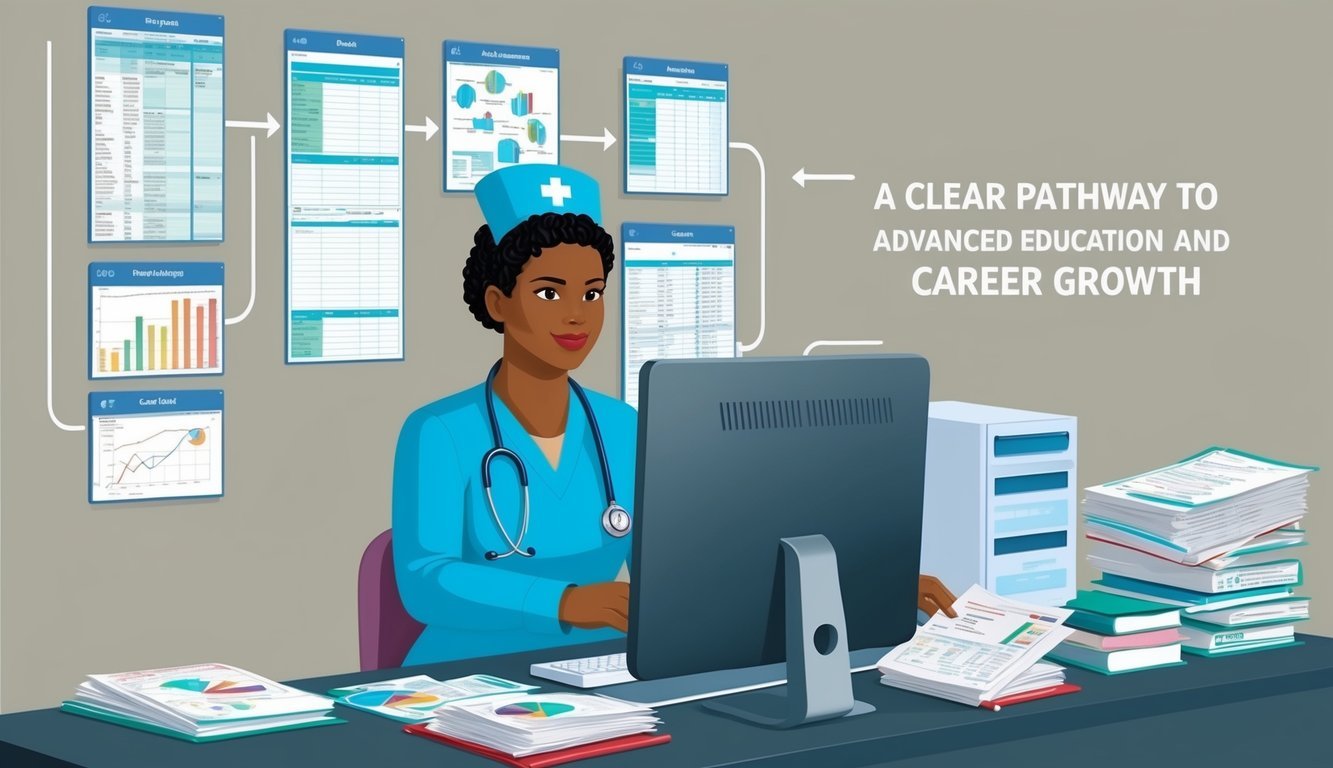As the healthcare industry increasingly integrates technology into patient care, the role of an informatics nurse has emerged as a vital area of specialization.
To become a nurse informatics specialist, you will need a combination of nursing education, experience, and knowledge of healthcare technology.
This evolving field focuses on the efficient management of patient information and the use of data to improve healthcare outcomes, placing informatics nurses at the intersection of nursing and technology.
You’ll start your journey by obtaining a Bachelor of Science in Nursing (BSN).
Many professionals in this field pursue further education, such as a Master’s degree in Nursing or a related discipline.
Gaining hands-on experience as a registered nurse is also crucial, as it allows you to understand the complexities of patient care while applying technology solutions effectively.
Certification in nursing informatics can enhance your credentials and open up advanced career opportunities.
With a growing demand for skilled professionals who can leverage data to improve patient care, entering the field of nursing informatics offers a rewarding career path.
Explore how you can contribute to this important area of healthcare and enhance your career prospects in the process.
For detailed steps on how to qualify, check out resources like NurseJournal and Nurse.org.
Understanding Nursing Informatics
Nursing informatics integrates knowledge, information, and data to improve patient care and enhance nursing practice.
This field combines nursing science with information technology to manage and analyze health information effectively.
Scope and Definitions
Nursing informatics is the science that combines nursing, computer science, and information science.
It focuses on how to integrate data and knowledge into nursing practice to enhance care delivery.
Key components include:
- Data: Raw facts that can be analyzed to inform decisions.
- Information: Data processed to provide meaning.
- Knowledge: Information organized and contextualized for decision-making.
This discipline supports the optimization of health information technology systems, ensuring they meet the needs of healthcare providers and patients.
A nurse informaticist is essential in training staff and implementing technology solutions to improve patient outcomes.
For further insights on becoming an informatics nurse, visit Nursing Informatics: What It Is and How to Get Started.
History and Evolution
The landscape of nursing informatics has evolved significantly.
Initially focused solely on managing patient records, it has expanded to include analytics and data management.
Key milestones include:
- 1980s: The introduction of computerized patient records.
- 1990s: Development of the first nursing informatics certifications.
- 2000s: Increased emphasis on evidence-based decision-making using data analytics.
This evolution has led to a more sophisticated understanding of how health information technology can improve clinical workflows.
Nursing informatics now plays a critical role in shaping policies and practices that promote better healthcare delivery.
To explore more about the historic context, check out What is Nursing Informatics & How to Become a Nurse Informaticist.
Becoming an Informatics Nurse
As you pursue a career as an informatics nurse, understanding the specific role and the competencies required is essential.
This profession uniquely blends nursing practices with information technology to improve patient care and healthcare systems.
Role and Responsibilities
Informatics nurses, or nurse informaticists, play a crucial role in bridging the gap between clinical practice and IT.
They are responsible for optimizing electronic health records (EHR), ensuring data integrity, and facilitating training for staff on new technologies.
Key responsibilities include:
- Data Analysis: Collecting and interpreting healthcare data to inform clinical decisions.
- System Optimization: Ensuring EHR systems are user-friendly and support effective patient care.
- Collaboration: Working with IT professionals, management, and clinical staff to implement best practices.
- Education: Training nurses and other personnel on new systems and updates.
A comprehensive understanding of both nursing and information technology is vital to effectively execute these duties.
Core Competencies
To excel as an informatics nurse, you need a mix of technical and clinical skills.
Core competencies include:
-
Clinical Knowledge: You must have a solid foundation in nursing, which includes obtaining a nursing degree and an RN license.
-
Technical Proficiency: Familiarity with healthcare technologies, data management, and analytics tools is essential.
-
Communication Skills: The ability to communicate complex IT concepts in understandable terms for clinical staff is critical.
-
Problem-Solving: You should demonstrate strong analytical abilities to address issues related to healthcare information systems.
Most informatics nurses also engage in continuing education to stay updated with the latest advancements in healthcare technology.
For more details on how to enhance these competencies, consider exploring resources on nursing informatics.
Educational Pathways
A strong educational background is essential to becoming a nurse informatics specialist.
This pathway often includes a combination of undergraduate and graduate studies, along with opportunities for ongoing education.
Here’s a breakdown of what you need to know.
Undergraduate Degrees
To enter the field of nursing informatics, you must start with a solid foundation.
You can accomplish this by earning a Bachelor’s Degree in Nursing (BSN).
This degree typically requires:
- 72 to 120 credits: Depending on the institution and whether you are pursuing a traditional or accelerated program.
- Clinical experience: Hands-on training during your coursework, which enhances your understanding of patient care and healthcare technology.
For those already registered nurses looking to advance, an RN to BSN program can be an efficient pathway.
This program allows you to complete a bachelor’s degree while leveraging your nursing experience.
The American Nurses Credentialing Center (ANCC) recognizes a BSN as a critical step for certification in nursing informatics.
Graduate Studies and Specializations
Once you have a BSN, pursuing a Master of Science in Nursing (MSN) is a common choice.
Many MSN programs offer specific tracks in informatics.
Key components include:
- Advanced coursework: Subjects such as data management, healthcare systems, and information technology.
- Capstone projects: Practical experiences that allow you to apply your knowledge in real healthcare settings.
A specialized degree not only improves your knowledge but also enhances your job prospects.
You may consider certifications like the ANCC Informatics Nursing Certification, which validates your expertise in the field.
Online and Continuing Education
Many accredited institutions now offer online nursing degrees designed for working professionals.
These programs provide flexibility, allowing you to balance work and study effectively.
Key advantages include:
- Access to diverse resources: Online platforms may include interactive modules, virtual simulations, and community forums.
- Continuing education opportunities: Attending workshops, webinars, and conferences helps you stay updated with technological advancements in healthcare.
Investing in these educational pathways prepares you to excel in nursing informatics and positions you for a rewarding career in improving patient care through technology.
For more information, explore resources like Coursera’s Nursing Informatics and NurseJournal.
Certification and Licensure
Obtaining proper certification and licensure is crucial for advancing your career in nursing informatics.
It establishes your professional qualifications and ensures you meet industry standards.
This section outlines key components related to credentialing organizations, licensure examinations, the certification process, and maintaining credentials.
Credentialing Organizations
Several organizations provide certification for informatics nurses.
The most recognized are:
- American Nurses Credentialing Center (ANCC): Offers the Informatics Nursing Certification (NI-BC™), which is essential for validating your skills.
- Healthcare Information and Management Systems Society (HIMSS): Provides the Certified Professional in Healthcare Information and Management Systems (CPHIMS) credential.
- American Nursing Informatics Association (ANIA): While it does not offer formal certification, it promotes educational resources and networking opportunities for informatics nurses.
It’s vital to research each organization to determine which credential best aligns with your career goals.
Licensure Examination
Before pursuing informatics nursing, you must hold an active Registered Nurse (RN) license.
This typically involves passing the NCLEX-RN examination, which ensures you possess the necessary skills and knowledge.
| Requirement | Details |
|---|---|
| Eligibility | Complete an accredited nursing program |
| Exam Format | Computer-adaptive test |
| Topics Covered | Safe and effective care, health promotion, psychosocial integrity |
Passing the NCLEX-RN is a prerequisite for obtaining your RN license, which is essential for further certification in nursing informatics.
Certification Process
To become certified in informatics nursing, you must follow specific steps.
The ANCC requires the following:
- Eligibility: Hold an active RN license and have a minimum of 2 years of full-time nursing experience.
- Education: Complete 30 hours of continuing education in informatics nursing, or hold a master’s degree in informatics nursing.
- Examination: Pass the certification exam, which tests your knowledge in various informatics domains.
You should apply through the ANCC’s website and prepare for the exam using their provided resources and study materials.
Maintaining Credentials
Once you obtain your certification, it is essential to maintain it through ongoing education and compliance with renewal requirements.
The ANCC requires:
- Continuing Education: Complete a specified number of continuing education hours related to informatics nursing.
- Renewal Period: Certifications typically need renewal every five years, ensuring you stay updated with current practices and technologies.
Staying active with organizations like HIMSS and ANIA can also help you access valuable resources for professional growth.
Regularly engaging in educational opportunities reinforces your commitment to the field.
Career Opportunities and Advancement

A career in nursing informatics offers diverse job opportunities and avenues for professional growth.
As the healthcare industry increasingly relies on technology, the demand for skilled informatics nurses continues to rise.
Job Outlook and Settings
The job outlook for nurse informaticists is promising, with significant growth expected in various settings.
According to the HIMSS Nursing Informatics Workforce Survey, approximately 60% of informatics nurses earn over $100,000 annually, reflecting the role’s importance.
You can find nurse informaticists in:
- Hospitals
- Healthcare IT firms
- EHR vendors
- Consulting agencies
These professionals often collaborate with medical and health services managers to improve healthcare delivery systems and ensure data integrity.
Advanced Roles and Leadership
As you advance in your career, you can take on leadership roles.
Opportunities for positions like Chief Nursing Informatics Officer and Chief Information Officer become available.
These roles are crucial for shaping health IT strategies.
Roles like nursing informatics specialist let you focus on implementing technology solutions that enhance patient care.
Advanced education, such as a Doctor of Nursing Practice (DNP), can further elevate your career.
It prepares you for these leadership roles and expands your expertise in healthcare systems.
Informatics nurses often lead initiatives to optimize electronic health records.
They also streamline processes and maintain compliance with regulations.
This positions them as integral parts of organizational success.

